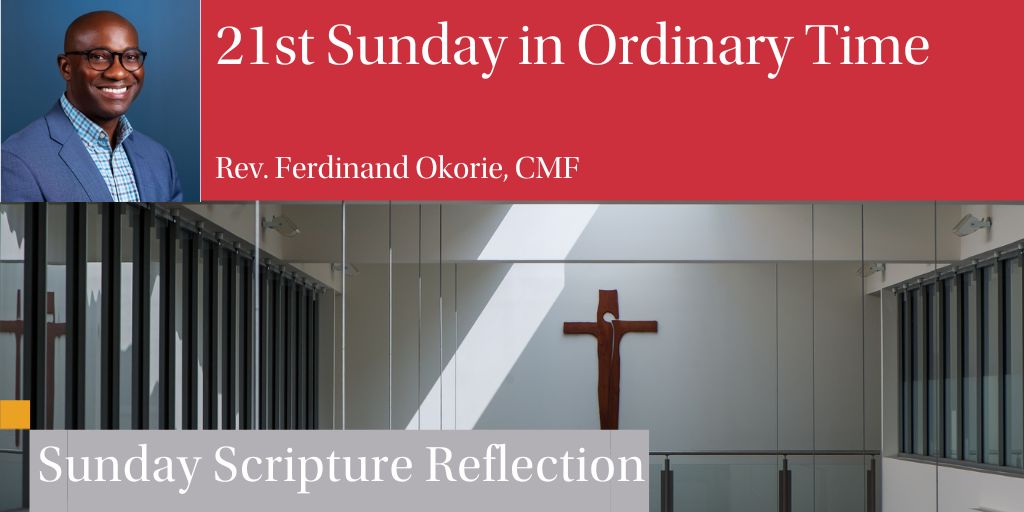
Readings:
Jos 24:1-2a, 15-17, 18b
Ps 34:2-3, 16-17, 18-19, 20-21
Eph 5:21-32
Jn 6:60-69
When Delgado and his household decided to migrate from the social and economic hardships, exacerbated by decades of political unrest in Venezuela into the United States, they were convinced that their dreams and prospects of a better life in the United States will be impossible without God’s providential guidance. Like most migrants from Central and South America determined to reach the United States through the southern border, the Delgados believed that their hope of freedom and flourishment would only be possible through God divine presence and gracious intervention in their lives. They held onto this belief and conviction through the treacherous and often uncertain circuitous journey from Venezuela to the United States. At every stage of the journey, and often apprehensive, they felt the presence of God’s providential care as they pulled together their collective resolve to flourish.
God’s providence freed the children of Israel from the inhumanity of slavery in Egypt into a land of freedom and self-determination. The confession of the generation who arrived at the Promised Land was based on God’s effort to bring their forebears out of Egypt. Their allegiance to God is as a result of their experience of liberation, freedom, the gift of life and self-determination. They said to Joshua: “far be it from us to forsake the Lord who brought us and our fathers up out of the land of Egypt, out of a state of slavery” (Josh 24:16). Their allegiance is an act of gratitude for what God has done in their life. In a similar vein, acting at the spokesperson of the disciples, St. Peter publicly commits the group’s allegiance to Jesus Christ on the basis of their experience of life that only Jesus Christ can give: “you have the words of eternal life” (John 6:68). St. Peter’s profession of faith and his declaration of the conviction about the divine status of Jesus Christ come from his own experience. The words (hrēmata) of Jesus Christ about what God is doing in the world through his ministry are the source of eternal life. The teachings of Jesus Christ give life, bring hope and reassure the followers of Christ of God’s divine plan for the salvation of the world. In the narrative of John 6, the teachings of Jesus Christ include the invitation to share in the food of life that Jesus gives, namely, his body. Today we celebrate the eucharist as the banquet of life, sharing in the life of Jesus Christ in community with one another, and celebrating our one identity as the children of God. In the invitation to share in the life of Jesus Christ in the eucharist, our lives are transformed and unbounded by the limitedness of earthly life and the captivity of finitude. The invitation to share in the life of Jesus Christ is offered to us because Christ loves us and has given himself up for our sake as we read in the Second Reading (Eph 5:25).
Let us remember that the children of Israel’s experience of liberation, freedom and a new lease on life from the condition of slavery in Egypt began with God’s pledge to come down and liberate them after their cries reached God (see Exod 3:7-8). God pledged to liberate the children of Israel by might, power and diplomacy from the inhumane treatment of Pharoah. By making this commitment, God becomes a leader and savior of the children of Israel who is in solidarity with their human condition. Similarly, Jesus Christ gave up himself (paradidomi hautou; Eph 5:25) on the cross and in the eucharist so that the church will be consecrated, made pure, spotless and presented in glory (Eph 5:26-27). In Jesus’ gratuitous self-gift for the church, the church regains life and the essence of our union with God with the hope of eternity as St. Peter confesses in the Gospel.
This Sunday we listen to the invitation to commit to the wellbeing of one another, to elevate the nobility and value of each other’s humanity just as God did for the children of Israel in the First Reading, and Jesus for his followers in the Gospel. Persuasively, our family relationship ought to be established on a loving service of presence to one another in the same manner that we desire to experience love from others. Couples ought to exude family relationship on the basis of building up one another in dignity, respect and mutual support of the humanity of each other as a child of God, for whom Jesus Christ has gratuitously given up himself so that we may have life in abundance. Specifically, the Second Reading assigns husbands the important role of creating a family environment where the values of self-giving, and flourishment are attained. Therefore, let our love for one another be sincere, altruistic and a true example of Christ’s love for each one of us.
Ferdinand Okorie, CMF
